While it takes planning to put together a one week trip, it can take even more preparation when you plan to be gone for 3 months or more. With some help from my travel blogging friends, here are some ideas that should help you with your planning for your epic adventure.
Table of contents: ()
Trip Itinerary Planning
Trip Planning Spreadsheets
Edwina from TravelingGerman.com writes:
A multi-month trip requires a massive planning process, so in order not to get overwhelmed with all the different planning aspects, I like to keep everything organized and in one place. I do this by creating one big Google Spreadsheet Document with multiple tabs:
- To Do List: By having this on the first sheet, I can quickly refer to it whenever I have a few minutes for trip planning and can see what needs to be done most urgently (Editor: Start this now. Use this post to help you create your todo list)
- Itinerary & budget: Whilst I like to keep things flexible, having a plan means I spend less time on the road researching, and can quickly refer to it when needed. Planning in a spreadsheet means changing something in week one automatically updates everything else further down and I can see how it affects my – usually fixed – flight date back home.
- Packing list: Categorized, so I can plan ahead but easily pack things last minute if needed
- Daily spends: We usually give ourselves a daily budget based on spending money and hotel budget plus an “extras” fund for expenses like visa on arrival costs, local SIM cards and occasional splurges that you just can’t say no to – like an epic one week motorbike tour through the Vietnamese highlands that would have completely blown our normal daily budget.
Using Google Docs has been a great success because we can access the document from any of our devices and, traveling as a couple, even edit it simultaneously. And being disciplined with keeping a detailed expense log hasn’t just helped us manage our budget, but has also brought back great memories when looking back at it like a diary years later.
Here’s a link to our trip planning template that used when we’ve planned two three-month long Asia trips.
Wendy from AdventurousRetirement.com adds:
For the past 4 years my husband and I have travelled for 3-4 months. This is what we use for planning:
Itinerary Spreadsheet – Detailed Itineraries are especially important for easy access when moving every 2-4 days over 4 months. I capture everything I learn in a spreadsheet during the research stage. When finalizing plans, the information is organized for ease of use.
- Accommodations with length of stay, address, GPS coordinates, contact information, time zone, cancellation policy, and total quoted price.
- Prearranged car rentals details.
- Activities/excursions of interest or booked – contact details and web links.
- Flights – all flight details; also in the Trip Case app for direct notifications.
Spreadsheets make it easy to stay in the moment at each locale, especially with a complicated trip like ours – 45 accommodations, 23 flights, 11 rental cars, and 4 boat trips (link for this trip). I always keep my paper tables on hand.
I agree with Wendy that keeping itinerary information in an app is useful, but I use the free version of tripit.com to keep track of flights, hotels, and rental cars. It is simple to update. When you get a confirmation email you simply forward it to plans@tripit.com and it will be added to your itinerary.
Trip Itinerary and Booking
For long term travel there are a few different approaches. Many travelers will get an away and a return ticket and will plan everything in the middle on the road, while some are more comfortable having more detailed plans. To cross some borders they will want to see your ticket home or at least your ticket to leave the country.
If you do know your itinerary and it is an around the world trip, you should also consider buying a special around the world ticket using the widget below. In general with a round the world ticket you get a certain number of stops but you have to pick a direction, either west or east and maintain that travel direction.
Around the World Tickets and Other Complicated Routes
Have travel planners research thousands of flight combinations to create one-of-a-kind routes for your next round-the-world trip
When planning a long term trip it can be difficult to figure out where to start. I like to start with a list of countries I would like to visit and I usually end up writing down twice as many places I would like to visit than is possible in the time. So then I go back and look at my list and try to come pick a few of my must visit places.
Once I have a revised list I like to create a spreadsheet with the number of days I will be on the trip and the dates. So if I am going away for a year long overseas experience, I’ll have a spreadsheet with 365 lines and the dates I will be away. I will then start populating it with information such is on Day 1 – Fly to Hong Kong, and then fill out the next few lines with Hong Kong because I want to spend a few days there.
It is important to have a few dates set along the way during your long term travel. If you have an around the world ticket you will have to do this already as you will need to book the dates you will fly from one country to another. That way you will know that you have two months in Asia before heading to Europe.
I like to use my itinerary to put in must see sights as well that way I have booked time in my schedule to go there. So if I put three days to see the temples of Angkor Wat I have it booked in. I can always change it to four days or down to two days if I want but I have an idea of how long I will be there. You don’t want your itinerary to be completely booked out as you do want to have the chance to be spontaneous during your trip.
Patrick from GermanBackpacker.com writes:
I just spent 8 months in Latin America – planning for such a long trip is not easy and might seem to be impossible, but with a few things in your mind, you’re ready for your big adventure. For me, it’s always easy to have a rough itinerary and plan. It’s not realistic to plan ahead for several months, but it’s helpful to have an idea of your journey.
When I embarked on my big trip, I had a rough idea about the time that I want to spend in every country. I knew from which country I would most likely fly back home, and I could check early enough for cheap flight routes. I tried to make sure to end up in one of the cities in South America from where flights to Europe are the cheapest (in my case from Salvador, Brazil). If you do a quick research, you’ll see that every continent has a few airports from which it’s best to fly overseas, so it’s great if you finish your trip in one of these.
However, don’t plan too strict – plans change, there are some places you’ll like more than expected, some places you’ll like less than expected. Be flexible – if you’re not happy in a certain place or country, just leave and spend more time somewhere else. I also make sure that I’m prepared for travels between countries – some research about visa requirements and border crossings (especially overland) helps to avoid any unpleasant surprises.
Keep in mind the climate – and get some information about the areas you’ll visit: When is the rainy season, when is the dry season? When should a region be avoided, e.g. because of the risk of hurricanes, typhoons or the monsoon? You’re on a long-term trip, so you’re flexible and you can plan around to make sure to have good weather. Planning such a long journey seems to be a big challenge, but it’s also part of the experience and I’m sure you’ll have an unforgettable trip.
Somnath from TravelCrusade.org writes:
I prefer booking flights and homestays at least one month prior to the travel date to save costs,avoid last minute rush and unavailability of proper accommodation. I do detailed research on the place I am planning to visit. I then draft a plan by following the country map to make my plans for stay at each location. I also try to call or email the tourist information center of the country I am visiting to find out any relevant information required for the trip.
Kylie from OurOverseasAdventures.com writes:
If we have a reasonable idea of our itinerary, we always negotiate rates for long-term stays in places where we’re staying for longer than a week or two (such as AirBNB or holiday-let type accommodation). We’ve successfully negotiated stays in Bali, Sri Lanka, Malaysia, France and Croatia – even in peak season – where we’ve asked for a reduction in price due to the length of a stay.
From an owner’s perspective it can be less maintenance and admin hassle to have the property leased for a longer period of time, so we’ve found they’re definitely open to reducing the price. We found this approach works best when we book at least four months out – the owners love having a guaranteed tenancy that far in advance.
We’ve also negotiated other ways to save on accommodation costs, for example during a three month stay in France we did our own cleaning which additionally saved us the weekly 50 euro cleaning charge. Or when there was an additional cost for our children we ask the owner to waive the fee due to the duration of the booking.
This approach also works particularly well in areas that are on the outskirts of a city or town. In Sri Lanka we stayed slightly outside of a town which meant we weren’t walking distance to the beach and restaurants, but the owner was really open to giving us a discount on the published rate and the small cost of a 5 minute tuk-tuk to all the action more than compensated.
- Search for Great Tours HERE
- Get a Car Rental
- Book Your Accommodation HERE
- Buy Travel Insurance
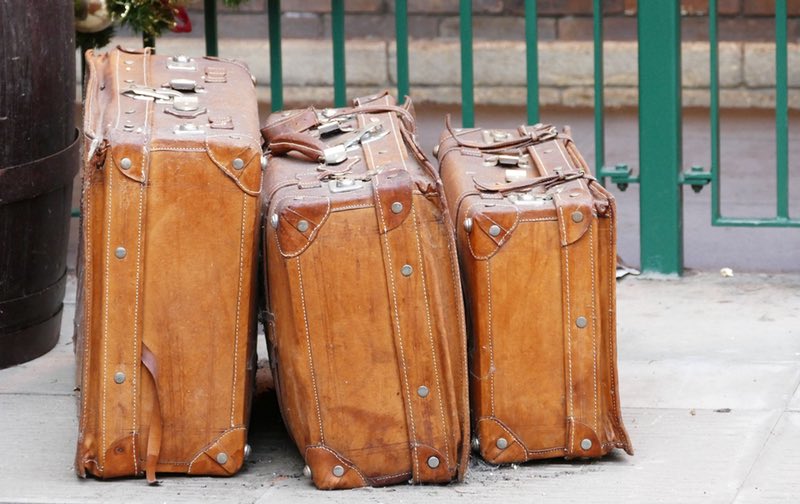
Packing
I don’t tend to pack any more for a longer trip than I do for a 7-10 day trip. Like when I am at home I wash clothes when they get dirty.
To minimize the amount of clothes you need to carry, in addition to layering, also choose clothes in a specific color scheme. For ladies, scarfs are a good way to add color but not a lot of extra weight. They can also be helpful to have in your day bag to get into a church, temple, or mosque.
See What I Pack
Rosemary & Claire from AuthenticFoodQuest.com write:
When it comes to packing, we only take the minimum and prioritizes clothes that we can use to layer up. The one thing we never leave home without is Activated Charcoal. These magical pills help prevent food poisoning, keeping us safe, as we eat our way around the world.
To keep us entertained, we load up our Amazon kindles with a range of books including business books and Spiritual/personal development reading material. To have a constant supply of books, we connect to our U.S. public library, whereby we can constantly borrow books when traveling.
Paperwork
As useful as your planning spreadsheets are, for somethings you will still need actual paperwork.
Claire from TalesOfABackpacker.com writes:
As dull as it might be, getting your paperwork in order is an essential part of planning for any long-term travel.
- Passport: The first thing to check is your passport validity. Many countries require at least 6 months validity and/or several blank pages before granting you entry.
- Visas: Each country has different entry requirements, so check if your nationality needs a visa before entering each country you plan to visit. Remember, you may need to send your passport to the embassy to get the visa, which can take weeks – so check and plan as far in advance as you can. Others may only require a visa on arrival, or no visa at all.
- Vaccines: Check if any specific vaccines are required for entry, such as yellow fever, which some countries ask for proof of the vaccination in the form of a certificate.
- Insurance: Travel insurance is also very important for any travel. Long-term travel may need special coverage, as some policies only last a limited amount of time. Make sure your policy covers you for visiting all the countries on your itinerary. Keep an insurance card with you.
I also make a separate note of my passport number, credit card details, and useful phone numbers like your embassy, bank, insurance provider, family members, and anything else that may be useful in an emergency and can save valuable time.
Once you have all your paperwork in order, scan everything so you can keep an electronic copy of them on your email to access anywhere in the world and bring a paper copy with you (kept separate from the originals). It’s also a good idea to leave a copy of everything with your next of kin or trusted friend in case anything goes wrong while you are away.
Campbell & Alya from StingyNomads.com adds:
Driver’s License: If you’re going for a long trip take your driving license with you never know when you may need it. In some countries you need an international driving license in addition to a national one. An international driving license is cheap and only a payment is required, no testing. If you’re planning to rent a motorbike remember that in most countries you need a special license as well. You might be able to rent it without having one but if road police stops you be ready to pay a fine.
Sarah from LiveDreamDiscover.com adds:
A minimum of one month before our departure we do our research and make sure we know exactly what travel documents are required for our upcoming travel. Depending on where you plan to go you may need the following:
- Passport with at least six months remaining before expiry
- Visa for countries that require one
- Immunization records
- International drivers license
- Travel insurance
- Travel itinerary (some border controls may want details of your exact travel plans)
- Your consulate contact info in the countries you’re traveling to
- Extra passport photos (for visas)
Banking When You Travel
Campbell & Alya from StingyNomads.com write:
If you’re venturing on a long term travel it’s very important to sort out your banking stuff; credit cards, online banking, monthly payments etc.
- Credit Cards: First of all make 100% sure your cards won’t expire while you’re on the road otherwise prepare for trouble. If it’s a close call get a new card as a backup and put some money on it. Nothing can be worse than to be stuck in a foreign country without money, except maybe to be stuck without documents. Second thing make sure you can use your card worldwide or at least in countries where you’re planning to go.
- Online Banking: Activate online banking to be able to do all transactions, payments etc. online. We find it quite handy as well for planning our budget, making sure we don’t spend too much etc.
- Multiple Credit Cards: It’s better to have more than one card. You never know sometimes one may not work, get stolen or lost. Keep cards separate.
- Emergency Numbers: Have your bank emergency number and necessary security information ready in case you need to block the card.
Raul from ILivetoTravel.me writes:
- Automatic payment: Set up bills for automatic payment (or pre-pay) if you don’t want to take care of this (or can’t) while away.
Rosemary & Claire from AuthenticFoodQuest.com write:
- ATMs: On the financial side, we use our Charles Schwab checking account, which offers free ATM withdrawals anywhere in the world. With this system, we can feel secure not having to carry a lot of cash on us and most importantly, save money when withdrawing funds.
Security When You Travel
Raul from ILivetoTravel.me writes:
- State Department:Register your travels with the State Department.
Sarah from LiveDreamDiscover.com adds:
For our important documents we always make sure we carry copies separate from the original documents. There’s not much use in storing a copy of your passport with your passport as it’s likely that they would both be lost or stolen together. We keep our important originals (passport, bank cards etc) on our bodies either in a secure purse, wallet or money belt. The physical copies are stored together in a case or bag that we keep in our carry on or suitcase. A large pencil case/bag like you used in school works great or even a Ziplock bag.
Wendy from AdventurousRetirement.com writes:
Digital security (VPN) – We purchased a VPN (Virtual Private Network) several years ago; it provides privacy on all our digital communications (phones, tablets and laptops).
NordVPN is a VPN that works on 6 different devices simultaneously and is well-rated.
I also recommend the following:
-
-
- padlock (if you plan to stay in a hostel or travel by night train)
- money belt or pouch
- a theft-proof purse/backpack. My wife uses the Pacsafe Citysafe CS200 Handbag and I love my Pacsafe Metrosafe LS350 Backpack.
-
Preparing Your Home and Affairs For Your Absence
Renting Your Home
Pari from traveling-pari.com wrtes:
Traveling long-term while generating passive income is something that many frequent travelers aspire to. With the advent of Airbnb, you can leverage your house to cover some, if not all, of your travel expenses. However, to make this idea a success, proper planning and organization is key.
First, plan your long-term travel in advance. This will allow you ample time to list your property online and get some responses. In order to reduce the maintenance tasks, it is preferable to rent out your house for a longer duration to the same tenant than multiple short stay tenants. To encourage this, you can advertise discounts on long term rentals.
Once you have found tenants, there are other concerns such as key handoff, cleaning before and after each visit, answering questions and concerns of the tenants. Remember, one bad review is all it takes to seriously affect your future rental opportunities.
One way to handle this is to ask a friend to help in exchange for part of the rental fee. Also, these days specialized rental companies have propped up which cater specifically to short-term Airbnb rental. For a percentage of the rental income, they handle all these tasks along with listing your property on Airbnb.
For security, you could install an alarm system that you can control remotely. Some systems come with a remotely controlled lock system which can do away with the key handoff problem. In this case, make sure you change the pin remotely every time a tenant leaves. Also, list house rules clearly so that the tenants don’t bother your neighbors.
When it comes to your personal belongings, you can either lock away your important belongings in a secure cupboard or hire a storage unit. Always check the previous reviews of the tenant before you agree to rent out your apartment. If everything is set in order, you can now enjoy your travels worry free.
Read more at Welcoming Strangers – Becoming an Airbnb Host
Security of Your Home
Wendy from AdventurousRetirement.com writes:
Backups: We make two backups of all digital data for each device and store them in different locations. Backups include 1) on our home server, 2) to a 2-terabyte external hard drive, and store it in a safe deposit box.
We recently installed a Ring Video Doorbell Pro which not only lets us see who is coming or has come to the front door but even lets us talk to the person at the front door as long as we have an internet connection on our smartphone.
Power of Attorney
Mar from OnceInALifetimeJourney.com writes:
“I have gone on extended trips several times before and I am also a long term expat, living outside of my native Spain since 2006 and found that one of the most useful things I ever did was giving my mother full power of attorney to handle any legal matters on my behalf.
In Spain, this means that she can do anything as if she was me except for getting married or divorced. That is, she can sign a mortgage or buy property on my behalf, and she has indeed done so when my grandmother passed away and I acquired one of her properties while I was on the road. She also regularly deals with the government on matters related to taxation thanks to the power of attorney she has.
Obviously, given the legal extent of the powers she has, it would be wise only to give them to someone you truly trust but power of attorney is very useful to avoid unexpected last minute costly trips when you are traveling long term”.
I was thinking it is probably just as well that the Power of Attorney does not give Mar’s mother the power to get her married or divorced. I feel some mothers might abuse that power.
Handling Your Mail
Wendy from AdventurousRetirement.com writes:
Mail: We forward postal service mail to a trusted party. Mail is opened and processed for us. Critical mail items or those requiring immediate attention are electronically scanned and placed in an encrypted folder for our access. We use DropBox with BoxCryptor for enhanced security.
Digital Backups (phone, laptop, tablet, etc.)
If you don’t have a friend or family member willing to take in your mail you can get a service that will handle it. Sign Up Now For Earth Class Mail
Notifications
Raul from ILivetoTravel.me writes:
Notify credit cards, banks, utilities, alarm company, neighborhood/condo association, etc. of your absence.
Preparing Your Job Family For Your Absence
Somnath from TravelCrusade.org writes:
Before planning a long term vacation,I would first inform my colleagues about my unavailability and update them about my leave plans. I would then inform my family and friends about my whereabouts and absence in that period. I would also try to finish any planned work before that to avoid delays and cancellations.
For some, a long trip is a chance to take a sabbatical, use up accumulated vacation, or take a leave of absence. Others get permission from their company to try working on the road so that they can support their travels.
Health
Nate from TravelLemming.com writes:
Traveling to foreign countries is fun. Getting sick in one isn’t.
That’s why before leaving for a long trip, it’s critical to do everything you can to maximize your chances of staying healthy while on the road.
- Immunizations: One of your very first to-do items should be visiting a doctor or travel clinic to get your immunizations updated.Some vaccines require time to take effect, or subsequent booster shots, so it’s best to go as early as you can. I learned this the hard way after waiting to visit the clinic until the day before a year long trip around the world. I ultimately missed out on several shots I probably should have had!
- Yellow Fever: Depending on your itinerary, you may be required to show a Yellow Fever Certificate for entry into some countries. Carry that with your passport and email a copy to yourself.
- Malaria: if you’re heading to somewhere with a malarial risk, considering buying anti-malarial pills before leaving. Although you can often find them abroad, many of the higher-end, lower-side effect brands might not be available.
- Insurance: be sure to sort out your medical insurance situation before you leave. Many domestic insurers won’t cover care abroad, which is why many travelers opt for travel insurance. But be careful before discarding that domestic health insurance as useless. If you’re an American, you need to evaluate whether you’ll be required to pay a tax penalty for failing to carry it.
As they say, an ounce of prevention is worth a pound of cure. I managed to travel to six continents over the course of a year while experiencing little more than a few cases of food poisoning. But not everyone is so lucky, so don’t neglect health-related preparation before leaving.
Raul from ILivetoTravel.me writes:
- Medications: Get enough meds for anything you normally take and know the medication’s main ingredient (not just the medication’s name) in case you need to find locally somewhere. Get a letter from your doctor explaining that meds you carry are doctor-ordered and keep medications in the pharmacy bottles with the labels to make it easier to get through customs in some countries.
James from Portugalist.com writes:
The mini first aid kit also gets a replenish with medications like Paracetamol, Ibuprofen, and sea sickness tablets as well. Although it’s possible to get these on the road, I usually find that they’re more expensive or, sometimes, harder to find.
I also carry a small collection of over-the-counter medications that will get me by before I can get to a pharmacy. I carry:
-
-
- A mild over-the-counter sleep aid (no not Ambian)
- ibuprofin
- anti-diarrheal medicine
- anti-mucus medicine for coughs
- cough drops
- cold pills like Aleve D
-
Read more at 8 Frequently Asked Questions about Travel Health.
Language Study
Ingrid from SecondHalfTravels.
Doing language study before your trip will enrich your travels and provide many practical benefits. You’ll be able to ask directions, negotiate prices, and read street signs and menus. Even more rewarding are the special connections you’ll make speaking with locals in their mother tongue.
For long-term travel, try to choose a language used in multiple countries on your trip. For most of Latin America, Spanish is the obvious choice. Depending on your itinerary, Russian, Mandarin, French, or Arabic might also be good options.
It’s best to start the process before your trip. Take a local class or use a self-study kit like Pimsleur. Listen to free language-learning podcasts during your commute and at the gym. Check out Duolingo, a popular gamified learning platform. The flashcard apps Memrise and Anki are great for vocabulary drills. Watch TV shows and movies in your target language to practice listening comprehension. To improve your conversation skills, attend a local Meetup, or take lessons with a native speaker on iTalki or Verbling. Or arrange free online language exchanges using sites like My Language Exchange.
On your travels, consider attending a language school coupled with a homestay. It’s a great way to make new friends and take a deeper dive into the local culture. There are Spanish schools all over Latin America and Spain, but you can also study Arabic in Cairo, Russian in Saint Petersburg, or Chinese in Guilin, to name a few.
Before leaving, research language schools on TripAdvisor and Yelp. For Spanish, check out 123TeachMe’s school directory. Look for schools with recent positive reviews that offer after-class activities. Most schools can arrange homestays with local families. Prices are often very reasonable for a package including 20 hours of weekly classes and accommodation.
Relationships
Travel Partners
Who you travel with can have more impact on how good your trip is than any other factor, but a long trip can put additional stresses on relationships.
Chris from OneWeirdGlobe.com writes:
The tight quarters of a plane or bus, the stress of navigating, and any number of other issues can test even the strongest relationships. Add to that constantly being together, and the smallest spark can start a fight.
My wife and I have traveled internationally together for five years through well over a dozen countries. We’ll travel and enjoy many places together, but we will follow a few rules:
- We don’t need to go everywhere together. These days are usually scheduled as ‘Operation Separate Ways’, and allow us to pursue our own interests. She’ll check out the churches, I’ll go off to the flea market
- When working at home, we’ll set up our offices in different rooms (ideally at different ends of the apartment and/or behind closed doors).
- End of the day, we’ll almost always eat together… and there’s always time for cuddling
Making Friends
Stefan from NomadicBoys.com writes:
We’ve done several long term trips as Nomadic Boys, in particular in Asia, Europe and Latin America. One of the most rewarding things we’ve done in our travels is connecting with locals and developing a circle of friends with them. This is because we’ve found you get to see the best of a destination through the eyes of locals, enabling you to obtain a far deeper appreciation of the place you’re visiting.
One of the most fun ways to do this is with cooking classes. Some of the best cooking classes are usually with a local who is really passionate about their culture and keen to share it with others. We always try to do this in every new country we visit. This is also a great way to get a deeper understanding of the culture by learning about the different cuisines.
Another way is to research a good tour guide. One way we recommend is checking out the Free Walking Tours available in most big cities. Most of the time they are led by students who are looking to top up their income via tips made on the tour. They are always an excellent source of knowledge of the best places to hang out and trendiest places to hang out.
We also recommend using social networking apps like Instagram and Twitter to connect with locals via the location search function and relevant hashtags.
Traveling With Kids
Lisa from FlipFlopGlobetrotters.com writes:
When we traveled as a couple, we didn’t need much more than our essentials in a backpack and a plane ticket. We never made itineraries and loved the flexibility that gave us. Fast forward a good few years and now we travel with our son. A lot changes when you travel with kids, but at the same time a lot stays exactly the same. So, when we decided to go on a 10-month travel adventure to South East Asia with our toddler boy, we didn’t make an itinerary either. In retrospect I really wish I’d done more research. A list of recommended destinations by other traveling families would have helped tremendously.
While we were on the road, I spent way too much time behind my laptop, trying to figure out where we’d go next. It was quite stressful and the internet connections were often absolutely awful. When it was just the two of us, we didn’t really care where we’d sleep, as long as it was moderately clean. Now that we were three, I suddenly had a whole new set of requirements for destinations and accommodation.
Prior to us leaving I became a member of some amazing family travel Facebook groups and they were a great help. Next time we go on such an adventure, I’ll make better use of the knowledge available in those groups. I’ll create lists with blog posts that cover the countries and regions we’re interested in and all the destinations and accommodations other families recommend. While we like to follow our own path and will always aim for maximum flexibility, I’d really rather spend time playing with our son than wasting hours behind my laptop trying to figure out where to go next.
Miscellaneous Tips
I am enjoying my switch to T-mobile which has the best service plan for Americans for traveling abroad as it includes both free roaming and free data roaming (not high speed) in 140+ countries.
Raul from ILivetoTravel.me writes:
- Roll some duct tape on a pencil – the most practical item to bring along!
Rosemary & Claire from AuthenticFoodQuest.com write:
One of the best things we’ve done to run our business when traveling long term is establishing a Google Voice number. With this number, we receive messages as emails, saving us the hassle of dealing with expensive roaming fees. Not only is the number free, you also don’t run the risk of missing important messages. Do keep in mind that you have to set this number up in the U.S. before embarking on your travels.
Staying fit is an important aspect of our lives on the road. We always make room for our Asics running shoes, allowing us to run in local marathons and maintain our running routine wherever in the world we may be.
James from Portugalist.com writes:
Planning for a long-term trip, in many ways, is the same as planning for a short-term trip. You need to pack clothes, organize visas, check your passport is in date, get your vaccinations, etc. Unless it involves changing climates, I generally don’t pack that much more for a long-term trip than I do for a shorter trip, but I do have to think ahead a little more.
I sort out my tech when I’m home as gadgets and electronics are more expensive abroad, and the internet is often slower. This means buying any new electronics or accessories that I’ll need over the coming months like new external hard drives. Sometimes I’ll also do a complete Windows re-install if the laptop is running slowly (which it’s good to have a fast internet connection for).
Jorge from www.couplertw.com writes:
When you travel long term it’s important to be able to use as many means of transportation as possible. Learning how to properly ride a motorbike and driving a manual car will make your life much easier on the road, particularly if you want to visit off the beaten track destinations and roam freely through the countryside.
Learning how to ride a motorbike is particularly useful before traveling in Asia. In most of these countries it’s very common to rent a motorbike for your daily life or for travel independently to tourist attractions. It’s both cheaper and much more fun than going on tours. Many tourists ride bikes without practice which is reckless, dangerous and easily avoided. Not being able to rent and drive a bike was our biggest disappointment in our first long-term trip through South East Asia.
It’s also a good idea to take a few hours to learn or practice driving cars with a manual transmission. In some countries, it may be difficult to find cars with an automatic transmission. Being comfortable with both will make your life much easier on the road. Plus, driving a manual car can be great fun.
Mindset – What to Expect from a Long Term Trip
Finally, when you picture this big trip of yours, you probably are picturing the highlights. You picture seeing the famous sites that you have dreamed of. You may not be picturing the hours of travel or the log waits in airports or bus stations. You may be picture everything going right. It won’t. You may picture the highlights of your trip, but they may or may not be what you remember most from your trip. Perhaps one of the most important things to prepare is your expectations.
Clelia Mattana from www.KeepCalmAndTravel.com writes:
I tell travelers to avoid having too many expectations, to try and learn the art of “going with the flow” as much as possible (not much planning beforehand), to get ready for unpleasant surprises and experiences too, and to be aware that those same “bad” experiences will actually become the best things that could ever happen to you during your trip: They will teach you invaluable lessons for life and will help you in discovering who you really are. You will realize things about yourself that you had never imagined.
I will also stress the point that a long-term trip is not a vacation, and I encourage people to TRULY open themselves to the “stranger”, especially if you are a solo traveler like me. Don’t be too naive but be open-minded with people. During a trip of that scale, if you keep your mind open, you will come back home changed, with a vision of the world and the people that can be completely different from the one you had before. If not, nothing will change for you and you will come back with only a list of countries you have visited, a few good pictures and less money in your bank account.
It’s also important to be prepared for the “travel bug syndrome”. Some people plan a 6-9 months trip and, somehow, they manage to stay on the road for a lot longer than that. This may happen to you too. Or, conversely, the trip will make you realize that you actually want to go back home more than anything else, and you will appreciate your country a lot more, even if sometimes the people you left behind will be never able to grasp what you truly experienced out there, and that’s ok, it’s normal. All in all, there is no right or wrong.
That’s why my last suggestion is: Don’t feel guilty or judge your feelings too harshly during your trip. You are YOU and this is YOUR unique experience. You don’t need to conform to other travelers’ point of view and feel “in a certain way”, being it how you react to the unexpected or whether you hate a location that everyone seems to love. Taste the freedom of finally being able to think and feel whatever you want. The feeling of freedom during a long-term trip is something difficult to replicate in everyday life so, enjoy it to the fullest and don’t be afraid to dare to do things you could never do at home!
Conclusion
A longer trip deserves some planning. What planning tips would you add?
+Chris Christensen | @chris2x | facebook
8 Responses to “How to Plan for a Long Trip – The Definitive Guide”
Leave a Reply
Tags: article, featured, home security, long term travel, round the world, travel planning, trip planning

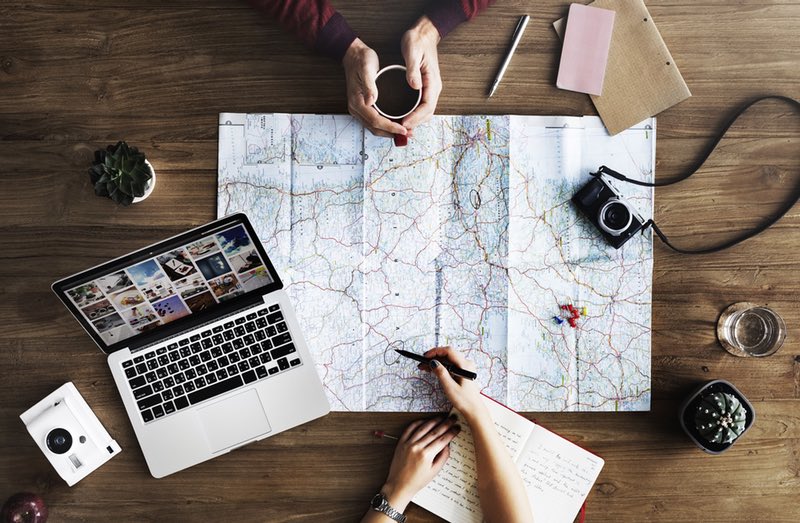
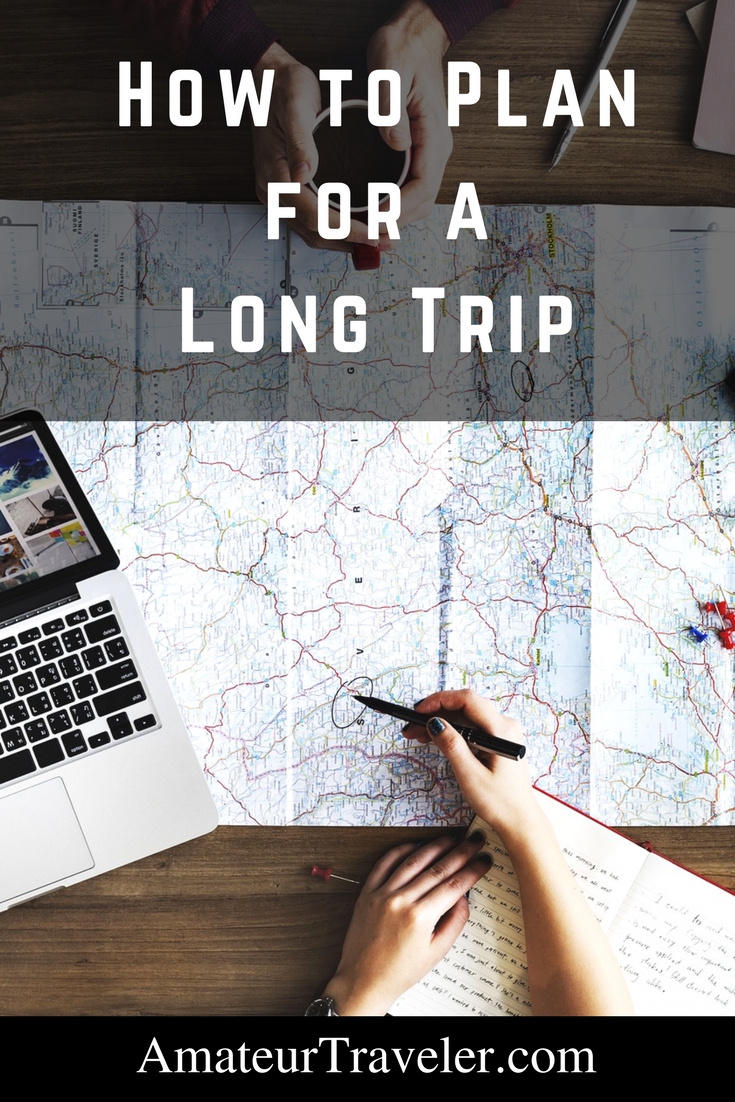



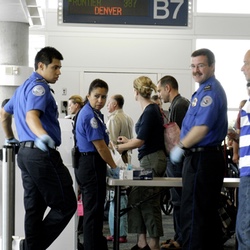 The Definitive Guide to Airport Security and the TSA
The Definitive Guide to Airport Security and the TSA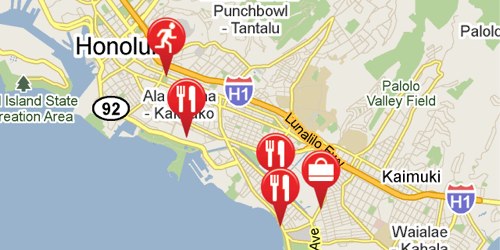 Plan Your Trip with TripDoc for iPhone
Plan Your Trip with TripDoc for iPhone Book Review: “Escape Plan – Ditch the Rat Race, Discover the World, Live Better for Less” by Mark Mason
Book Review: “Escape Plan – Ditch the Rat Race, Discover the World, Live Better for Less” by Mark Mason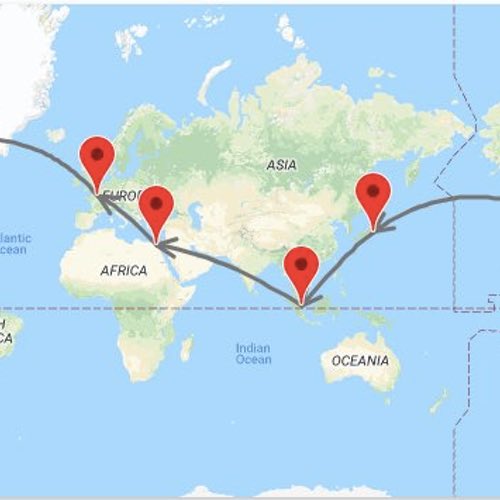 Guide to Round The World (RTW) Tickets
Guide to Round The World (RTW) Tickets

lee laurino
Says:February 17th, 2018 at 3:40 pm
shall read all this again………..for anything I missed and need to incorporate into my twice a year 3 month trips.
two challenges: traveling solo and being a ‘planner’ there is barley enough time to do research after a trip. and not having places to stay reserved means I spend too much time the week or days before the ‘next place I plan to visit’ finding a ROOM!
With two travelers you can divide the work and have someone to discus alternatives with.
2. traveling long term as a mature traveler. we all travel differently and I now chose to travel slow and with more comfort and assured safety. This is not for everyone but works for me……….i need to be within walking distance of where I want to go so if I cant find a taxi, uber or understand the bus, I am not stranded (again).
Patricia
Says:February 17th, 2018 at 6:31 pm
Thank you for the excellent article. I want so much to travel, just go to somewhere in Europe for three months and travel wherever I want. I know what is stopping me is “stuff.” I worry about leaving my house for that time. I have done it for 36 days or so but hesitate going for months. I will reread and consider all this excellent advice.
chris2x
Says:February 17th, 2018 at 10:21 pm
You are welcome. Clearly I had some help 🙂
chris2x
Says:February 17th, 2018 at 10:22 pm
I know what you mean. Our days of hostel dorm rooms are certainly over.
Kerry Dexter
Says:February 19th, 2018 at 5:43 am
A good range of tips, Chris, thank you. I’d add, on the practical side, pack repair tape for your backpack/rucksack/luggage — for this, duct tape is often not strong enough, especially long term. Also on the practical side, be prepared (even in first world countries) for the power to go out, internet access to go off, and you not to have access to all those things you’ve stored electronically. It does happen. On the spiritual side, plan in down time — a couple of days return to a favorite place, perhaps, or quiet time with no particular plans. This will refresh your journey, and depending on how long you are traveling, you may want to do this more than once. You need time to reflect and take in what you have been experiencing.
Adrea
Says:February 21st, 2018 at 6:54 am
Excellent tips Chris, for me safety goes first if you lose something or got robbed the travel mood is not the same anymore. My friends left a jacket in a rented car in Italy somewhere in Bergamo and just in twenty minutes car window, and the doors was smashed. They didn’t lose anything exept the coat, but Italian insurance company fined them for around 400 eur that was a pain. So You have to think through all steps you are making and be aware of every moment. Nobody will touch a person who is present, and aware of its surroundings. I would like to add to this article a bit more about security as well. My experienced showed me that if you are going to the metropolitan city’s you have to keep aware even of your wifi connections, Once my bank details been tracked, while I was booking train tickets in a coffee shop. It is good that I had a banking app which helped me to check my balance just in seconds whenever I need. So I could see that I started to make strange not relevant payments, so I blocked it immediately. You can check these frauds through public wifis are continually happening. Since I travel more than a 4 times a year I have nordvpn subscription so I would never connect to the public wifi unsecured. Like ever.
chris2x
Says:February 21st, 2018 at 11:01 am
I think that might be a seperate post… this one got a tad long 🙂
Philip
Says:April 10th, 2019 at 12:29 am
Wow! Very useful tips, Chris.